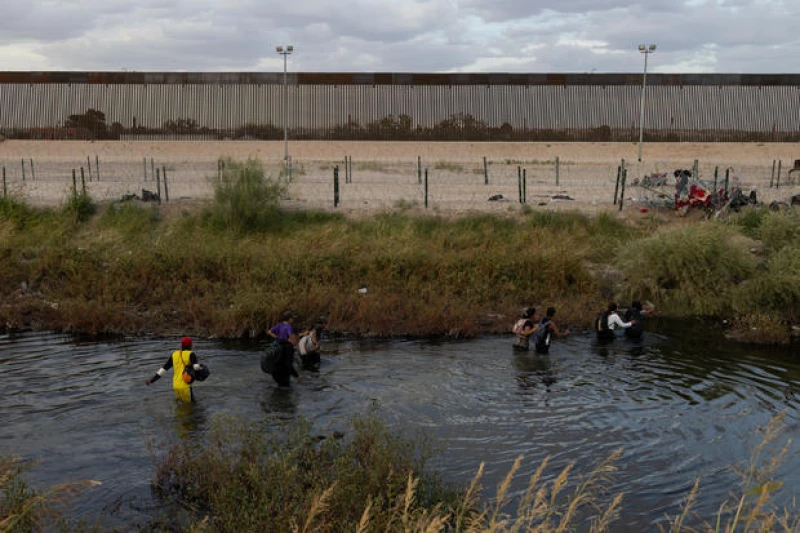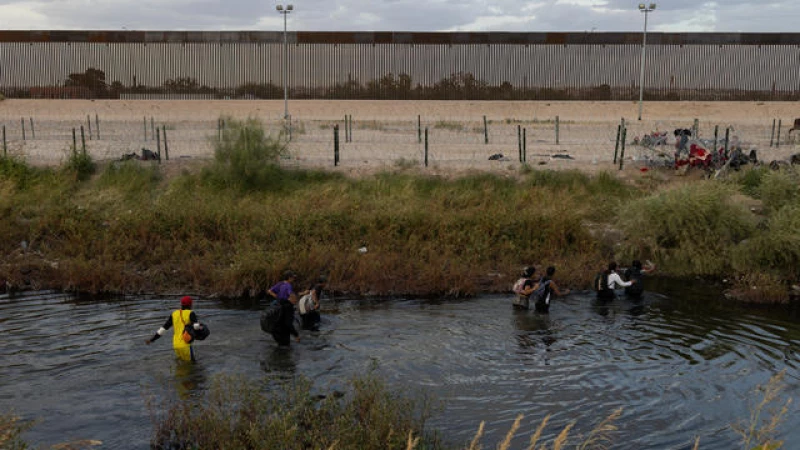Venezuelan Border Crossings Decrease After Deportations Begin
Washington — The number of Venezuelans crossing the U.S.-Mexico border illegally dropped dramatically in October, when the Biden administration started deporting some migrants directly to crisis-stricken Venezuela, according to Customs and Border Protection (CBP) data published Tuesday.
Border Patrol agents apprehended 29,637 migrants from Venezuela who entered the U.S. without authorization last month, a 46% drop from September, when unlawful crossings by Venezuelans soared to 54,833, a monthly record high.
The Biden administration announced in early October it had reached a deportation agreement with the Venezuelan government, a U.S.-sanctioned regime that had long refused to accept the return of its citizens. Officials at the time vowed to deport those found to be ineligible for asylum or a temporary legal status the Biden administration offered to 472,000 Venezuelans who arrived before July 31.
On Oct. 18, U.S. Immigration and Customs Enforcement (ICE) carried out its first-ever deportation flight to Venezuela. The agency has since staged weekly deportation flights there, deporting hundreds of Venezuelan adults under a process known as expedited removal.
Acting CBP Commissioner Troy Miller said the decrease in Venezuelan arrivals along the southern border was more pronounced after the deportation flights started.
CBP Sees Significant Decrease in Venezuelan Border Encounters
In a recent statement, the Customs and Border Protection (CBP) announced a 65 percent decrease in southwest border encounters of Venezuelans in the second half of October compared to the second half of September. This comes as CBP resumes removal flights to Venezuela as a consequence for those who cross the border unlawfully.
Furthermore, overall illegal entries along the southern border have also decreased. Border Patrol apprehensions of migrants who entered the U.S. without legal permission dropped below 189,000 last month, marking a 14% decrease from September's nearly 219,000.
It's important to note that these figures do not include legal entries under two programs implemented by the Biden administration to discourage unlawful migration. One program allows up to 30,000 Cubans, Haitians, Nicaraguans, and Venezuelans to fly to the U.S. each month if they have American sponsors. The other program enables migrants in Mexico to use a phone app to request an appointment for processing at an official border crossing. In October alone, more than 44,000 migrants were admitted into the U.S. through this app-powered process, according to federal data.

This significant decrease in Venezuelan arrivals, although potentially temporary, could be seen as a breakthrough moment for the Biden administration's efforts to manage the unprecedented levels of Venezuelan migration to the U.S. Since President Biden took office, U.S. border officials have processed over half a million Venezuelans who arrived in northern Mexico as part of a larger historic spike in migration.
Venezuelans Face Unique Challenges in the U.S.
The situation for Venezuelans in the United States has presented various difficulties for U.S. officials. Due to Venezuela's refusal to accept deportations from the U.S., a deal was negotiated with Mexico last year to send some Venezuelans back across the southern border. However, Mexico only accepted a limited number, resulting in the majority of Venezuelans being released into the U.S. pending a review of their cases after crossing the border.
Cities such as New York City, Chicago, and Denver have struggled to accommodate destitute Venezuelan migrants, as most of them do not have family or friends in the U.S. who can provide support.
One of the biggest challenges is the sheer number of displaced Venezuelans, making it the largest refugee-like population in the world. According to the United Nations, over 7 million people have left Venezuela in recent years to escape the severe economic crisis.
Migration analyst Adam Isacson from the Washington Office on Latin America believes that the deportation flights to Venezuela have influenced migrants' decisions to travel north. Many individuals considering migrating to the United States have heard about the deportations and have chosen to wait and see. However, Isacson acknowledges that this downward trend may change once Venezuelans realize that the U.S. is only deporting a small fraction of those crossing the southern border. The dire conditions in Venezuela, including extreme poverty, insecurity, and an authoritarian government, remain unchanged.







